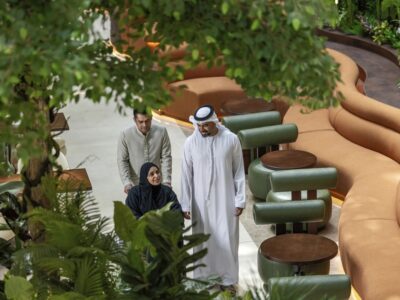46 year-old singer Kathem Al Saher was born in the northern Iraqi city of Mosul, the son of a palace worker and has nine siblings. Little did he know he was to become one of the most successful Iraqi entertainers the now war-torn country has ever seen.
Al Saher has established himself as one of the biggest singers in the Arab world having sold over 30 million albums since the start of his career, influencing millions in the process. Ranging from romantic ballads to political work, from pop to classical Arab, Al Saher has covered a musical spectrum with the kind of success not seen since the heyday of Umm Kalthum. Not classically trained, Saher’s interest in music instead came from listening to the radio. When he was 10 years old he sold his bicycle to buy a guitar and two years later, he began writing songs. He then switched to the more tradional oud and was accepted into the Baghdad Music Academy at the age of 21.
Although keen to make a break through into the music business with his songs and voice, he found himself rebuffed by all the producers he approached, who would only let him sing their own material. Instead, with a television director friend, he made a video of one of his songs, Ladghat El Hayya (The Snake Bite), which was slipped into a broadcast on Iraqi television in 1987, just after the Iran-Iraq war.
An allegory to his situation, it caused a major controversy and the powers that ran television offered him a choice – to change his lyrics or have it banned. He refused to change anything, but the ban only made it more popular. He began giving concerts all over the Gulf and recording for labels in Kuwait.
The Gulf War and its immediate aftermath kept him pinned in Iraq, but in 1993 he moved to Lebanon, working with the poet Nizar Qabbani, who wrote lyrics to his music, before settling permanently in Cairo. Al Saher continued to release albums and tour, having become the biggest name in Middle Eastern music, one whose ballads grew bigger and more romantic, but who would also write classically influenced works, even when they might conceivably hurt his popularity.
Wider fame and a growing international reputation came in 1998 and beyond and later won him a UNICEF award for his song ‘Tathakkar’ which he performed in the US for Congress and the United Nations – one of the first real post-Gulf War cultural exchanges. The following year, he recorded a tribute to the Pope with the Italian Symphony Orchestra.
One of Al Saher’s most recent works was a song entitled ‘The War is Over’ (Entahat Al Harab) with former Phantom of the Opera star Sarah Brightman.







